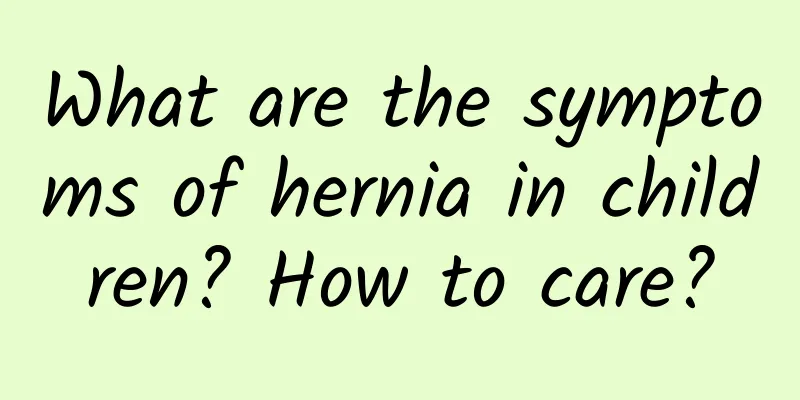What are the symptoms of hernia in children? How to care?

|
During the embryonic period, there is a "process vaginal process of peritoneum" in the groin, which can help the testicles descend into the scrotum or be fixed by the round ligament of the uterus. After some children are born, this process vaginal process does not close completely, causing the small intestine, omentum, ovary, fallopian tube, etc. in the abdominal cavity to enter this process vaginal process, which becomes a hernia. So what are the symptoms of hernia in children? What are the symptoms of hernia in children? 1. Pediatric hernias may occur a few days, months, or even years after a child is born. 2. Children with pediatric hernia usually develop a raised swelling in the groin when they cry, exercise vigorously or have dry stools, and sometimes the swelling extends to the scrotum or labia. However, the bump will disappear on its own when the child lies flat or when pressure is applied with the hands. 3. Once the hernia mass cannot be reduced, the child will experience nausea and vomiting, abdominal pain, fever, anorexia, crying or irritability. 4. Generally, in the early stages of pediatric hernia, the swelling will disappear on its own when the child lies flat and is quiet. However, as the intra-abdominal pressure continues to increase, the tumor will drop to the scrotum. At this time, let the child lie flat. If the swelling is pushed toward the abdominal cavity, and the swelling returns to the abdominal cavity along the channel through which the testicle descends and disappears, this is commonly known as "recurrent hernia." 5. If the tumor does not return to the abdominal cavity at that time, it will cause the abdominal pain symptoms to worsen. Not only will the child cry incessantly, but he will also have symptoms of intestinal obstruction such as abdominal distension, vomiting, and difficulty defecation. If an oval-shaped mass can be seen in the groin or scrotum, and it feels hard and painful to the touch, serious complications such as intestinal ischemia or even necrosis may occur if this persists for a long time. What should we pay attention to when caring for hernia in children? 1. Children with hernia should try to reduce and avoid activities such as crying, coughing, getting angry, constipation and strenuous exercise to avoid worsening of the condition. 2. Children with hernia should pay attention to rest at ordinary times. As the hernia falls, parents should use their hands to gently push it back into the abdominal cavity. 3. Children with hernia can increase their nutrition appropriately. Parents should feed them more foods that have the effect of replenishing qi, such as eggs, chicken, fish, meat, yam, etc. 4. Slightly older children can engage in appropriate physical exercise. 5. Children with hernia should receive timely and thorough treatment. |
<<: What is a migraine? What causes migraine vomiting?
>>: Can umbilical cord blood treat cerebral palsy? Why?
Recommend
How to maintain ovaries for women in their forties: Recommend several foods to maintain ovaries
After women reach the age of 40, their physical f...
I suddenly felt dizzy for only 1 second.
Although dizziness often occurs in our daily live...
Causes of spontaneous abortion of the first child
When a woman is pregnant with her first child, sh...
Pituitary tumor amenorrhea
Pituitary tumor is a relatively common oncologica...
The amount of menstrual flow is very small after the abortion
Being pregnant is a great thing, but for some peo...
Traditional Chinese medicine teaches you to stay away from heat and cold
There are many common diseases in life. Different...
Can uterine cold cause back pain?
Many women may suffer from uterine cold due to st...
Blood-heat and wind-dryness type skin disease
In Western medicine, skin diseases are divided in...
Why does menstruation cause itching?
Some women experience itchy skin during menstruat...
What are the postoperative care methods for lumbar spine
Lumbar surgery is an effective method for clinica...
What tests are done to diagnose mumps?
The symptoms of many diseases are very similar, s...
Is acne caused by spleen deficiency and dampness? What are the symptoms of spleen deficiency and dampness?
Acne on the face is not innate. For many people, ...
What should women eat to maintain their ovaries? Four foods are the most beneficial to health
For female friends, if they want to maintain thei...
Does urethritis cause itching?
The female body structure is somewhat different f...
What are the functions and effects of Citrus aurantium?
There are many medicinal values of Citrus auran...









